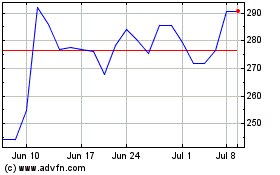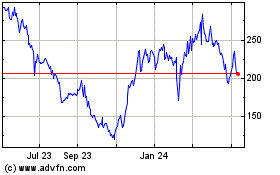Madrigal Pharmaceuticals, Inc. (NASDAQ:MDGL), a biopharmaceutical
company focused on delivering novel therapeutics for nonalcoholic
steatohepatitis (NASH)/metabolic dysfunction-associated
steatohepatitis (MASH), today announced the publication of positive
patient-reported outcomes data demonstrating Rezdiffra (resmetirom)
improved health-related quality of life (HRQL) in patients with
NASH with moderate to advanced fibrosis. The results were published
in the journal Hepatology.
Rezdiffra is a once-daily, oral, liver-directed thyroid hormone
receptor (THR)-β agonist designed to target key underlying causes
of NASH. It is the first FDA-approved medication for the treatment
of NASH. In the pivotal Phase 3 MAESTRO-NASH biopsy trial,
Rezdiffra achieved both fibrosis improvement and NASH resolution
primary endpoints, and 80% of patients treated with Rezdiffra 100
mg experienced improvement or stabilization of fibrosis. Rezdiffra
is indicated in conjunction with diet and exercise for the
treatment of adults with noncirrhotic NASH with moderate to
advanced liver fibrosis (consistent with stages F2 to F3 fibrosis).
Continued approval for this indication may be contingent upon
verification and description of clinical benefit in ongoing
confirmatory trials.
Zobair M. Younossi, M.D., MPH, FACP, FACG, AGAF, FAASLD,
Professor and Chairman of the Beatty Liver and Obesity Research
Program, Inova Health System, the Chairman of the Global NASH
Council and lead author of the HRQL analysis stated, “The serious
burden of NASH on patient quality of life remains poorly understood
and underappreciated by the health system. NASH is associated with
significant impairment of HRQL related to fatigue, lack of stamina
and other symptoms. Therefore, these results demonstrating that
Rezdiffra helped patients achieve clinically meaningful and
statistically significantly improvements in multiple domains of
HRQL are highly encouraging. Additionally, we found no worsening of
HRQL related to potential side effects of Rezdiffra in the
MAESTRO-NASH study, which underscores the tolerability profile of
the medication.”
In the study, changes in HRQL scores from baseline were
evaluated in patients receiving Rezdiffra versus placebo and
compared between patients with and without biopsy response. By
weeks 24 and 52, patients receiving both doses of Rezdiffra
experienced improvement of HRQL scores in the Worry domain of the
Chronic Liver Disease Questionnaire-NASH. At week 52,
Rezdiffra-treated patients who achieved fibrosis improvement or
NASH resolution experienced improvement in several HRQL domains,
including domains for Worry, Health Distress and Stigma. The
improvement in HRQL among Rezdiffra biopsy responders was
contrasted by no similar improvement in the placebo group. Biopsy
responders with stage F3 fibrosis at baseline had similar or more
pronounced improvements of HRQL in comparison to those responders
with F2 or F1B fibrosis at baseline.
Bill Sibold, Chief Executive Officer of Madrigal, stated, “NASH
is the leading cause of liver transplant among women and those who
get listed for hepatocellular carcinoma in the U.S. and the
unpredictable speed of NASH disease progression can cause serious
emotional distress for people living with the disease. In addition
to the health burden of NASH, patient advocates frequently tell us
they worry about the impact of the disease on their families and
plans for the future. The introduction of Rezdiffra as the first
FDA-approved therapy for NASH has provided hope for patients, and
we see this demonstrated in the improvements in health-related
quality of life observed in the MAESTRO-NASH trial.”
About NASH Nonalcoholic steatohepatitis (NASH)
is a more advanced form of nonalcoholic fatty liver disease
(NAFLD). NASH is a leading cause of liver-related
mortality and an increasing burden on healthcare systems globally.
Additionally, patients with NASH, especially those with more
advanced metabolic risk factors (hypertension, concomitant type 2
diabetes), are at increased risk for adverse cardiovascular events
and increased morbidity and mortality.
Once patients progress to NASH with moderate to
advanced liver fibrosis (consistent with stages F2 to F3 fibrosis),
the risk of adverse liver outcomes increases
dramatically. NASH is rapidly becoming the leading cause
of liver transplantation in the U.S. and is already the
leading cause in women.
Madrigal estimates that approximately 1.5 million patients have
been diagnosed with NASH in the U.S., of which
approximately 525,000 have NASH with moderate to advanced
liver fibrosis. Madrigal plans to focus on approximately 315,000
diagnosed patients with NASH with moderate to advanced
liver fibrosis under the care of the liver specialist physicians
during the launch of Rezdiffra.
NASH is also known as metabolic dysfunction associated
steatohepatitis (MASH). In 2023, global liver disease medical
societies and patient groups came together to rename the disease,
with the goal of establishing an affirmative, non-stigmatizing name
and diagnosis. Nonalcoholic fatty liver disease (NAFLD) was renamed
metabolic dysfunction-associated steatotic liver disease
(MASLD); NASH was renamed MASH; and an overarching term,
steatotic liver disease (SLD), was established to capture multiple
types of liver diseases associated with fat buildup in the liver.
In addition to liver disease, patients with MASH have at least one
related comorbid condition (e.g., obesity, hypertension,
dyslipidemia, or type 2 diabetes).
About Rezdiffra
What is Rezdiffra?
Rezdiffra is a prescribed medicine used along with diet and
exercise to treat adults with nonalcoholic steatohepatitis (NASH)
with moderate to advanced liver scarring (fibrosis), but not with
cirrhosis of the liver.
It is not known if Rezdiffra is safe and effective in children
(under 18 years old).
This indication is approved based on improvement of NASH and
liver scarring (fibrosis). There are ongoing studies to confirm the
clinical benefit of Rezdiffra.
Before you take Rezdiffra, tell your healthcare provider about
all of your medical conditions, including if you:
- have any liver problems other than NASH.
- have gallbladder problems or have been told you have
gallbladder problems, including gallstones.
- are pregnant or plan to become pregnant. It is not known if
Rezdiffra will harm your unborn baby.
- are breastfeeding or plan to breastfeed. It is not known if
Rezdiffra passes into your breast milk. Talk to your healthcare
provider about the best way to feed your baby if you take
Rezdiffra.
Tell your healthcare provider about all the medicines you take,
including prescription and over-the-counter medicines, vitamins,
and herbal supplements.
- Rezdiffra and other medicines may affect each other, causing
side effects. Rezdiffra may affect the way other medicines work,
and other medicines may affect how Rezdiffra works.
- Especially tell your healthcare provider if you take medicines
that contain gemfibrozil to help lower your triglycerides, or
cyclosporine to suppress your immune system, because Rezdiffra is
not recommended in patients taking these medicines.
- Tell your healthcare provider if you are taking medicines such
as clopidogrel to thin your blood or statin medicines to help lower
your cholesterol.
- Know the medicines you take. Keep a list of them to show your
healthcare provider and pharmacist when you get a new
medicine.
What are the possible side effects of Rezdiffra?
Rezdiffra may cause serious side effects, including:
- liver injury (hepatotoxicity). Stop taking Rezdiffra and call
your healthcare provider right away if you develop the following
signs or symptoms of hepatotoxicity: tiredness, nausea, vomiting,
fever, rash, your skin or the white part of your eyes turns yellow
(jaundice), pain or tenderness in the upper middle or upper right
area of your stomach (abdomen).
- gallbladder problems. Gallbladder problems such as gallstones,
inflammation of the gallbladder, or inflammation of the pancreas
from gallstones can occur with NASH and may occur if you take
Rezdiffra. Call your healthcare provider right away if you develop
any signs or symptoms of these conditions including nausea,
vomiting, fever, or pain in your stomach area (abdomen) that is
severe and will not go away. The pain may be felt going from your
abdomen to your back and the pain may happen with or without
vomiting.
The most common side effects of Rezdiffra include: diarrhea,
nausea, itching, stomach (abdominal) pain, vomiting, dizziness,
constipation.
These are not all the possible side effects of Rezdiffra. For
more information, ask your healthcare provider or pharmacist.
Call your doctor for medical advice about side effects. You may
report side effects to FDA at 1-800-FDA-1088 or
www.fda.gov/medwatch. You may also report side effects to Madrigal
at 1-800-905-0324.
Please see the full Prescribing Information, including Patient
Information, for Rezdiffra.
About Madrigal PharmaceuticalsMadrigal
Pharmaceuticals, Inc. (Nasdaq: MDGL) is a biopharmaceutical
company pursuing novel therapeutics for nonalcoholic
steatohepatitis (NASH), a liver disease with high unmet medical
need. Madrigal’s medication, Rezdiffra (resmetirom), is a
once-daily, oral, liver-directed THR-β agonist designed to target
key underlying causes of NASH. For more information,
visit www.madrigalpharma.com.
Forward Looking StatementsThis press release
includes “forward-looking statements” made pursuant to the safe
harbor provisions of the Private Securities Litigation Reform Act
of 1995, that are based on Madrigal’s beliefs and assumptions and
on information currently available to it but are subject to factors
beyond its control. Forward-looking statements reflect management’s
current knowledge, assumptions, judgment and expectations regarding
future performance or events. Forward-looking statements include
all statements that are not historical facts; statements referenced
by forward-looking statement identifiers; and statements regarding:
Rezdiffra (resmetirom) and its expected use for
treating NASH with moderate to advanced fibrosis.
Forward-looking statements can be identified by terms such as
“accelerate,” “achieve,” “allow,” “anticipates,” “appear,” “be,”
“believes,” “can,” “confidence,” “continue,” “could,”
“demonstrates,” ”design,” “estimates,” “expectation,” “expects,”
“forecasts,” “future,” “goal,” “help,” “hopeful,” “inform,”
“intended,” “intends,” “may,” “might,” “on track,” “planned,”
“planning,” “plans,” “positions,” “potential,” “powers,”
“predicts,” ”predictive,” “projects,” “seeks,” “should,” “will,”
“will achieve,” “will be,” “would”, “future” or similar expressions
and the negatives of those terms.
Forward-looking statements are subject to a number of risks and
uncertainties including, but not limited to: the assumptions
underlying the forward-looking statements; risks of obtaining and
maintaining regulatory approvals, including, but not limited to,
potential regulatory delays or rejections; the challenges with the
commercial launch of a new product, particularly for a company that
does not have commercial experience; risks associated with meeting
the objectives of Madrigal’s clinical studies, including, but not
limited to Madrigal’s ability to achieve enrollment objectives
concerning patient numbers (including an adequate safety database),
outcomes objectives and/or timing objectives for Madrigal’s
studies; any delays or failures in enrollment, and the occurrence
of adverse safety events; risks related to the effects of
Rezdiffra’s (resmetirom’s) mechanism of action; enrollment and
trial conclusion uncertainties; market demand for and acceptance of
our product; the potential inability to raise sufficient capital to
fund ongoing operations as currently planned or to obtain
financings on terms similar to those arranged in the past; the
ability to service indebtedness and otherwise comply with debt
covenants; outcomes or trends from competitive studies; future
topline data timing or results; our ability to prevent and/or
mitigate cyber-attacks; the timing and outcomes of clinical studies
of Rezdiffra (resmetirom); the uncertainties inherent in clinical
testing; and uncertainties concerning analyses or assessments
outside of a controlled clinical trial. Undue reliance should not
be placed on forward looking statements, which speak only as of the
date they are made. Madrigal undertakes no obligation to update any
forward-looking statements to reflect new information, events, or
circumstances after the date they are made, or to reflect the
occurrence of unanticipated events. Please refer to Madrigal’s
submissions filed with the U.S. Securities and Exchange
Commission, or SEC, for more detailed information regarding
these risks and uncertainties and other factors that may cause
actual results to differ materially from those expressed or
implied. Madrigal specifically discusses these risks and
uncertainties in greater detail in the sections appearing in Part
I, Item 1A of its Annual Report on Form 10-K for the year
ended December 31, 2023, filed with
the SEC on February 28, 2024, , and Part II, Item 1A
of its Quarterly Report on Form 10-Q for the quarter ended June 30,
2024, filed with the SEC on August 7, 2024, and as updated from
time to time by Madrigal’s other filings with the SEC.
Investor Contact Tina Ventura,
IR@madrigalpharma.com
Media ContactChristopher Frates,
media@madrigalpharma.com
Madrigal Pharmaceuticals (NASDAQ:MDGL)
Historical Stock Chart
From Dec 2024 to Jan 2025

Madrigal Pharmaceuticals (NASDAQ:MDGL)
Historical Stock Chart
From Jan 2024 to Jan 2025
